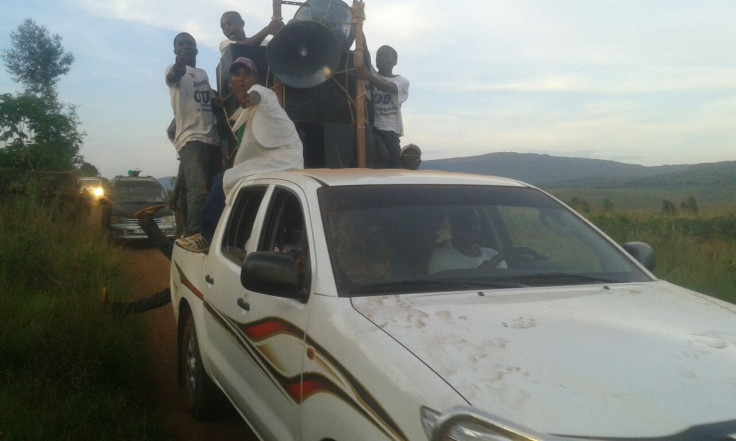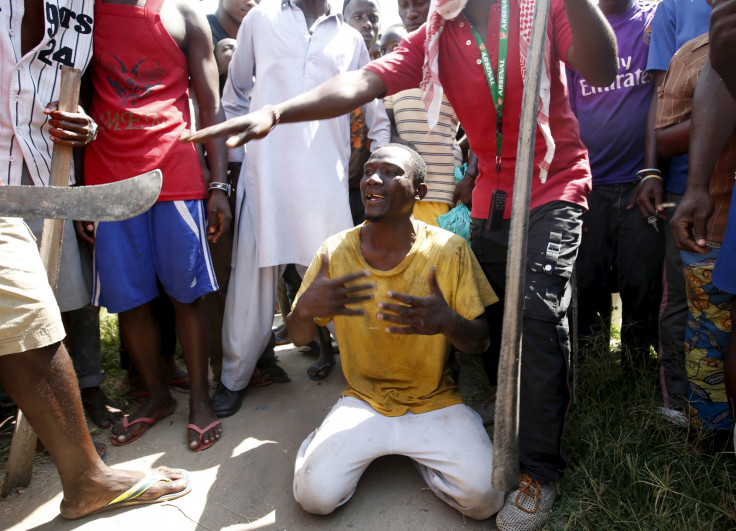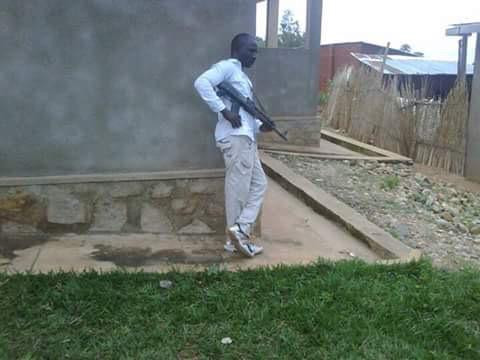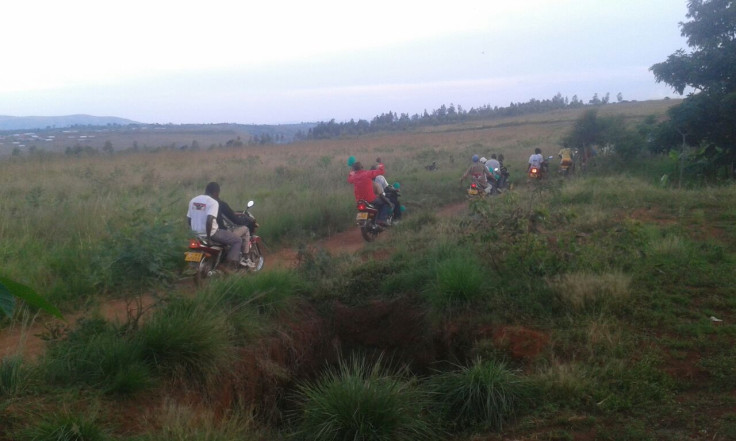Burundi: Who are the feared Imbonerakure youth?

East African Community leaders, the United States and some of Burundi's main coalition opposition parties have called for President Pierre Nkurunziza to disarm youth groups, including members of the ruling party National Council for the Defense of Democracy (CNDD-FDD)'s Imbonerakure youth wing.
While the Imbonerakure have often been accused of being behind a campaign of intimidation that has led to the flight of over 72,000 Burundians to bordering countries, the organisation remains misunderstood.
The Imbonerakure are not a monolithic organisation and, much like members of the CNDD-FDD itself, the group, whose average age is between 25 and 35, is made up of very different members of the Burundian society.
"The more educated ones have been to university but in general these are men who are likely to suffer unemployment the hardest if they are not connected politically, who may feel the economic consequences of the country very hard, and a lot of them were fighters during the civil war," Cara Jones, a university professor in political science at Mary Baldwin College and expert on Burundi, told IBTimes UK from Kigali in Rwanda.
Former rebel fighters
According to various estimates, the CNDD had between 8,000 and 12,000 fighters during Burundi's 1993 and 2005 civil war that killed more than 300,000.
After the end of the conflict more than 100,000 arms were removed civilians, according to presidential adviser Willy Nyamitwe.
From 2005, the CNDD-FDD, a major Hutu rebel group, benefited from a disarmament, demobilisation and reintegration programme, known as DDR, under which adult combatants assigned to it were granted two allowances of at least $515 (£336), distributed over two years, the first in cash and the second in kind.
At the end of the peace-building process, the ex-combatants were supposed to have been demobilised but Jones says many were never officially disbanded, or if they were, it was only partially.
"They were never fully demobilised because the national programme for the demobilisation was never completed," she said, pointing to the fact that the process was impeded by a lack of preparation and dire socio-economic situation.
"Now you have a group that is pretty aware of how a war works: if they were to be mobilised towards violent conflict, they have a lot of memory of what they should be doing and training. If these guys were to be remobilised, the learning curve would be much smaller."
That said, this knowledge may actually help mitigate a potential conflict, as the men, who lived through the war and remember the famine, may be unwilling to replicate the horrors of the war.

Lacking good command structure
Moreover, Jones explains, despite the CNDD-FDD having a president and an office in Bujumbura, the Imbonerakure lacks a good command structure.
"The individual province-level Imbonerakure are different from the national-level Imbonerakure. You have a lot of different strategies for how to mobilise them, even different clauses," Jones said.
In the country's south, for instance, many conflicts involving the group are about land and returnee issues.
She added: "There is not a national conversation about the CNDD-FDD versus everyone else, but more that there are lots of local conflicts involved in the Imbonerakure group."
In some areas, there have been reports of an Imbonerakure group going after partisans of the National Liberation Forces (Forces pour la Libération Nationale, FNL) "particularly hard because there might be a local conflict that they are involved in, such as someone may have talked to someone's sister wrong".
In Bugendana, in the centre of the country, witnesses have told IBTimes UK how a group of Imbonerakure, for instance, had threatened Tutsis in a refugee camp – an incident the government later condemned.
"They were showing they were going to cut your head off, with a finger on their throat. That really saddened people in the camp. That reminded us of the past, the massacres of 1993 and 1996 and the sociopolitical crises of 1993 to 2004," a refugee named Claude said.
Armed militia?
Members of the opposition in Burundi have, for a long time, alleged the CNDD-FDD has been arming the Imbonerakure.
"The East African Community cannot ask the Burundian government to disarm the militia because the ruling party is arming them," Leonce Ngendakumana, president of the main coalition opposition party the Democrats' Alliance for Change (ADC-Ikibiri), told IBTimes UK.
While estimates put the number of official Imbonerakure at 5,000 – those who have registered, who have their party ID card, and maybe have voting rights within the organisation if they are allowed to vote on decisions – the number of armed youth is estimated to be as little as 10%, around 500.

"I have very little doubt that there is a section of Imbonerakure that is armed and commits violence against civilians and other opposition party partisans, and that is most likely done at the behest of leaders within the party," Jones said.
"But it's probably underestimated, as there are lots of people who identify with that group, who maybe have never been official, or who have never received a card, or who support or consider themselves part of it but maybe don't fall into the official registry."
However, the organisation is, by and large, composed of young men, who have joined the group because they believe in the CNDD-FDD's message of development, not violence.
Improvements, not violence
The core of the CNDD-FDD does not have more than an sixth or eighth-grade education but most of those living in cities are educated and looking for more opportunities through economic and socio-development.
Jones said: "There are a group that was born of the war; that understands what is was like to be truly repressed, and can see good things for the future but don't necessarily know the steps to get there."
Many young men involved in the Imbonerakure are solely interested in becoming part of politics, as they see the CNDD-FDD as a reliable path to political and economic power, such as being in business.
"That group is much bigger than the guys who are joining I because of promises of cash or work – which may or may not involve violence," Jones explained.
The promise of cash has been reported in some of Burundi's more rural provinces, where young men are being enticed to join and allegedly enticed to commit violence because they are given money.
"I know that they get paid, and it could be anywhere between $50 and $100, and in some instances, much, much less. It's not a lot but the average salary, especially for a rural person, means that the cash rewards are enough to make it worthwhile," the professor said, referring to the fact she was told by 14 rural members that they were asked to commit violence in the 2010 election.

Political divisions about third term
Burundi has been rocket by violent protests since 26 April when the CNDD-FDD nominated Nkurunziza to stand for re-election for a third term in the upcoming 26 June elections, as opposition leaders claim it violates the country's constitution and the Arusha Accords, a peace deal that ended an ethnic civil war in 2005.
However, Nkurunziza's supporters within the CNDD-FDD argue the president's first term should be discounted as he was chosen by the parliament and not by the people in an election as is specified in the agreement.
But, surprisingly, many within the Imbonerakure are also said to be against the third mandate.
"Way more than we imagine to be. I've had them tell me this: that they believe the third mandate is a bad idea, which would be bad for the party and for themselves," Jones said.
For experts, these political divisions may keep the conflict from becoming more violent, despite contesters within the youth wing having not been very vocal.
"They are fearful about the consequences of their actions if they spoke up, as there is an unhealthy fear within the entire CNDD-FDD that if you speak out against the third term it means you are at the very least subject to death threats and intimidation," Jones added.
"I think that their reserve regarding the third term is keeping the violence from spinning out of control."
© Copyright IBTimes 2025. All rights reserved.






















